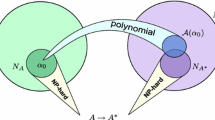Abstract
We consider a general approach to the construction of necessary, sufficient, and necessary and sufficient conditions that allow to ‘adapt’ a known optimal solution of an abstract combinatorial problem with a certain structure to a change in the initial data set for a fixed cost function ‘easily’ from the combinatorial point of view. We call this approach adaptive stability. Apparently, it is the first time that the approach is described for an abstract problem in a rigorous mathematical formalization.
Similar content being viewed by others
References
A. M. Lyapunov, The General Problem of the Stability of Motion (Gostekhizdat, Moscow, 1950; Taylor and Francis, London, 1992).
N. N. Krasovskii, Some Problems in the Theory of Motion Stability (Fizmatgiz, Moscow, 1959) [in Russian].
V. K. Leont’ev, “Stability in linear discrete problems,” Problemy Kibernet., No. 35, 169–185 (1979).
E. N. Gordeev and V. K. Leont’ev, “A general approach to the study of the stability of solutions in discrete optimization problems,” Comp. Math. Math. Phys. 36(1), 53–58 (1996).
V. A. Emelichev, K. G. Kuz’min, and A. M. Leonovich, “Stability in the combinatorial vector optimization problems,” Autom. Remote Control 65(2), 227–240 (2004).
V. A. Emelichev and K. G. Kuz’min, “Stability conditions for a multicriteria Boolean problem of minimizing projections of linear functions,” Trudy Inst. Mat. Mekh. UrO RAN 19(2), 125–133 (2013).
V. Emelichev, E. Girlich, and O. Karelkina, “Postoptimal analysis of multicriteria combinatorial center location problem,” Bul. Acad. Stiinte Repub. Mold. Mat., No. 3, 13–29 (2009).
M. V. Devyaterikova and A. A. Kolokolov, “On the stability of some integer programming algorithms,” Russian Math. (Iz. VUZ) 47(12), 38–45 (2003).
M. V. Devyaterikova, Stability Analysis for Problems and Algorithms of Integer Programming Based on Regular Partitions, Candidate’s Dissertation in Physics and Mathematics (Omsk, 2001).
I. V. Sergienko, L. N. Kozeratskaya, and T. T. Lebedeva, Stability and Parametric Analysis of Discrete Optimization Problems (Naukova Dumka, Kiev, 1995) [in Russian].
I. V. Sergienko and V. P. Shilo, Discrete Optimization Problems: Challenges, Solution Methods, and Research (Naukova Dumka, Kiev, 2003) [in Russian].
T. I. Sergienko, “On the stability with respect to constraints of a multicriteria problem of integer programming,” Dokl. Akad. Nauk USSR, No. 3, 79–81 (1989).
M. Libura, “Optimality conditions and sensitivity analysis for combinatorial optimization problems,” Control Cybernet. 25(6), 1165–1180 (1996).
E. S. Poort, Aspects of Sensitivity Analysis for the Traveling Salesman Problem, PhD Dissertation (Groningen, 1997).
E. E. Ivanko, “Sufficient conditions for the optimal route stability in the traveling salesman problem in the case of adding a new vertex and deleting an existing vertex,” Vestn. Udmurt. Gos. Univ., No. 1, 46–56 (2010).
E. E. Ivanko, “A stability criterion for an optimal route in the traveling salesman problem under the addition of a new vertex,” Vestn. Udmurt. Gos. Univ., No. 1, 58–66 (2011).
E. E. Ivanko, “Sufficient stability conditions in the traveling salesman problem,” Trudy Inst. Mat. Mekh. UrO RAN 17(3), 155–168 (2011).
E. E. Ivanko, “A stability criterion for optimal solutions of a minimax problem about a partition into an arbitrary number of subsets under varying cardinality of the initial set,” Trudy Inst. Mat. Mekh. UrO RAN 18(4), 180–194 (2012).
E. E. Ivanko, “Optimal route stability in the traveling salesman problem under the addition and deletion of vertices,” in Discrete Optimization and Operations Research: Abstracts of the Russian Conference, Chemal, Russia, 2010 (Inst. Mat. SO RAN, Novosibirsk, 2010), p. 105.
E. E. Ivanko and A. M. Grigor’ev, “Domains of optimal route instability in the traveling salesman problem under the addition of a new vertex,” in Algorithmic Analysis of Ill-Posed Problems: Abstracts of the International Conference, Yekaterinburg, Russia, 2011 (Inst. Mat. Mekh. UrO RAN, Yekaterinburg, 2011), pp. 232–233.
E. E. Ivanko, “Stability in a combinatorial optimization problem as a polynomial ‘adaptability’ of optimal solutions under a perturbation of the set of initial data,” in Discrete Optimization and Operations Research: Abstracts of the International Conference, Novosibirsk, Russia, 2013 (Inst. Mat. SO RAN, Novosibirsk, 2013), p. 117.
E. E. Ivanko, Stability and Instability in Discrete Problems (RIO UrO RAN, Yekaterinburg, 2013) [in Russian].
Author information
Authors and Affiliations
Corresponding author
Additional information
Original Russian Text © E.E. Ivanko, 2014, published in Trudy Instituta Matematiki i Mekhaniki UrO RAN, 2014, Vol. 20, No. 1.
Rights and permissions
About this article
Cite this article
Ivanko, E.E. Adaptive stability in combinatorial optimization problems. Proc. Steklov Inst. Math. 288 (Suppl 1), 79–87 (2015). https://doi.org/10.1134/S0081543815020091
Received:
Published:
Issue Date:
DOI: https://doi.org/10.1134/S0081543815020091



